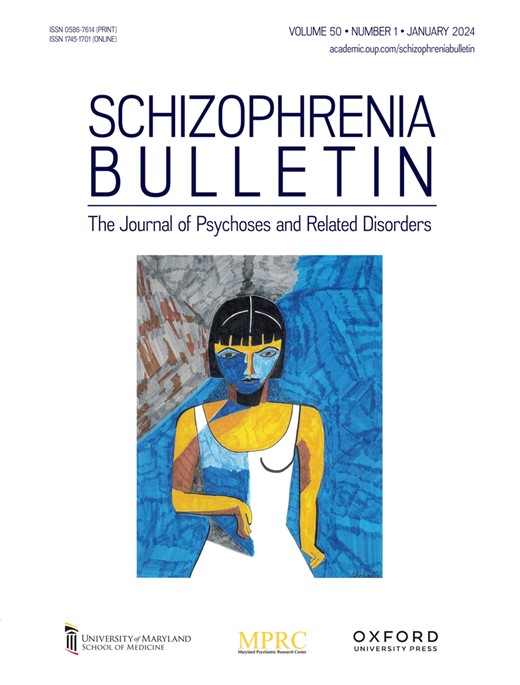Predictors and Outcomes Associated with 25-Year Cognitive Decline in Psychotic Disorders
IF 5.3
1区 医学
Q1 PSYCHIATRY
引用次数: 0
Abstract
Background and Hypothesis Cognitive impairment, a key feature of psychosis, is linked to poor functional outcomes. This study aimed to identify predictors and outcomes associated with cognitive decline in psychotic disorders. Study Design Data were taken from the Suffolk County Mental Health Project, a first-admission longitudinal cohort study of individuals with psychotic disorders. Participants were recruited from all 12 inpatient psychiatric facilities in Suffolk County, New York. Cognitive function was assessed at 6-month, 24-month, 20-year, and 25-year follow-ups. This analysis includes 400 participants with at least 2 estimates of general cognitive ability. A mixed effects model with random slopes and random intercepts was employed to estimate individual cognitive trajectories. The estimated random slopes for each participant were then used to predict 25-year clinical outcomes. Study Results No baseline predictors of subsequent cognitive decline were identified. Faster cognitive decline was associated with lower odds of remission, recovery, employment, financial independence, and worse social function 25 years after first admission. Conclusion Cognitive decline may be an indicator of illness severity more broadly and may therefore be a useful indicator of who might benefit from known interventions targeting clinical outcomes. Intervening in cognitive decline itself may have widespread beneficial effects on outcomes in psychotic disorders.与精神障碍患者25年认知能力下降相关的预测因素和结果
背景与假设认知障碍是精神病的一个关键特征,与不良的功能预后有关。本研究旨在确定与精神障碍患者认知能力下降相关的预测因素和结果。研究设计数据来自萨福克郡心理健康项目,这是一项针对精神病患者的首次入院纵向队列研究。参与者是从纽约萨福克县所有12家精神病院招募的。在随访6个月、24个月、20年和25年时评估认知功能。这项分析包括400名参与者,他们的一般认知能力至少有两种估计。采用随机斜率和随机截距的混合效应模型来估计个体认知轨迹。每个参与者估计的随机斜率然后用来预测25年的临床结果。研究结果没有发现随后认知能力下降的基线预测因素。首次入院25年后,认知能力下降速度越快,缓解、恢复、就业、经济独立和社会功能恶化的几率越低。结论认知能力下降可能是疾病严重程度的一个更广泛的指标,因此可能是一个有用的指标,可以从已知的针对临床结果的干预措施中受益。干预认知能力下降本身可能对精神疾病的预后有广泛的有益影响。
本文章由计算机程序翻译,如有差异,请以英文原文为准。
求助全文
约1分钟内获得全文
求助全文
来源期刊

Schizophrenia Bulletin
医学-精神病学
CiteScore
11.40
自引率
6.10%
发文量
163
审稿时长
4-8 weeks
期刊介绍:
Schizophrenia Bulletin seeks to review recent developments and empirically based hypotheses regarding the etiology and treatment of schizophrenia. We view the field as broad and deep, and will publish new knowledge ranging from the molecular basis to social and cultural factors. We will give new emphasis to translational reports which simultaneously highlight basic neurobiological mechanisms and clinical manifestations. Some of the Bulletin content is invited as special features or manuscripts organized as a theme by special guest editors. Most pages of the Bulletin are devoted to unsolicited manuscripts of high quality that report original data or where we can provide a special venue for a major study or workshop report. Supplement issues are sometimes provided for manuscripts reporting from a recent conference.
 求助内容:
求助内容: 应助结果提醒方式:
应助结果提醒方式:


